Growth Hacking Culture
The Growth Hacking Culture Podcast is a series of insightful interviews with prominent experts on mindsets, skills and mental resources to grow individually, lead motivated teams and create human-centric work cultures.
These episodes are about thought provoking ideas to scale up and growth hack human-centric and performing work cultures.
Hosted by Ivan Palomino.
The Growth Hacking Culture Podcast is a series of insightful interviews with prominent experts on mindsets, skills and mental resources to grow individually, lead motivated teams and create human-centric work cultures.
These episodes are about thought provoking ideas to scale up and growth hack human-centric and performing work cultures.
Hosted by Ivan Palomino.
Episodes

Wednesday Oct 23, 2024
Wednesday Oct 23, 2024
Understanding Generation Z's unique expectations and values is essential for businesses aiming to attract and retain top talent. This generation has distinct priorities that influence their career choices and workplace satisfaction. Companies that understand Gen Z's values can create a more appealing workplace culture, boost employee engagement, enhance their reputation as an employer of choice, and drive innovation by harnessing the creativity and problem-solving skills of Gen Z employees.
About Hannah
Hannah MacDonald-Dannecker is a Gen Z expert, public speaker, and advocate for bridging generational gaps in the workplace. As a member of Gen Z, she provides valuable insights on recruiting, managing, and retaining young talent. Hannah is the author of Well Shit: Time To Grow Up, a memoir that explores her journey of self-growth, tackling issues like imposter syndrome and navigating adulthood. She also hosts the popular podcast "Workish," where she discusses topics relevant to young professionals.
Learn more about her book Well Shit: Time To Grow Up https://a.co/d/gjwnIDa
Connect with Hannah on LinkedIn https://www.linkedin.com/in/hannah-kay-macdonald/
Her business website https://bettertogethergroup.com/
What we discussed with Hannah on The Ideal Work Culture for Gen Z
What are the most common misconceptions about Gen Z in the workplace?
How do Gen Z's expectations and values differ from previous generations at work?
What are the key features of a workplace culture that appeals to Gen Z employees?
How can companies build a culture of inclusivity and belonging for Gen Z talent?
What can Gen Z do to effectively communicate their needs and expectations to employers?
What advice do you have for managers working with Gen Z employees for the first time?
What risks do companies face if they don't adapt their workplace to meet Gen Z's needs?
How does technology shape Gen Z's ideal work environment?
BONUS
Watch this video on What GenZ expect from your work culture
https://youtu.be/N2IgamLhGJ8?si=TG5jHVpM1i_UQMNQ
_____
About the Growth Hacking Culture Podcast
The Growth Hacking Culture Podcast is a series of insightful interviews with prominent experts on mindsets, skills and mental resources to grow individually, lead motivated teams and create human-centric work cultures. These episodes are about thought provoking ideas to scale up and growth hack human-centric and performing work cultures. Hosted by Ivan Palomino

Wednesday Oct 16, 2024
Wednesday Oct 16, 2024
In this episode, Utkarsh Narang shares how fear, often seen as a barrier, can actually fuel bold decision-making, drive innovation, and help shape resilient leaders. We’ll explore how leaders can embrace fear as a tool for growth and uncover strategies to use fear constructively in leadership.
About Utkarsh Narang
Utkarsh Narang is a seasoned Learning Consultant, Executive Coach, and Facilitator with a passion for understanding human behavior. Based in Melbourne, he uses his diverse global experience to design leadership programs that help organizations unlock their potential and foster courageous leadership.
Watch his inspiring TedTalk on Can Fear Push Us to be Courageous? https://youtu.be/5aj0btxnBLo?si=6ZyrB_M8cxCCU3qJ
Reaching Utkarsh:
On his company website IgnitedNeurons https://www.ignitedneurons.me/
On Linkedin https://www.linkedin.com/in/utkarsh-narang/
What We Discussed in this Episode on How Fear Can Fuel Bold Leadership in Organizations
The Courage Paradox: Utkarsh explained how fear can be transformed into courage in leadership and shared insights on how to embrace this paradox.
Common Misconceptions: We discussed the common pitfalls leaders face when trying to use fear to drive courageous actions.
Types of Fear: Utkarsh helped us differentiate between paralyzing fear and fear that propels leaders forward.
Building a Culture of Courage: We explored how leaders can foster a workplace environment where acknowledging fear is safe and constructive.
Strategic Courage: Utkarsh provided strategies for ensuring that fear-driven actions are not reckless but are thoughtful and strategic.
Real-Life Examples: He shared stories of leaders who effectively used fear to fuel their courage and achieve bold outcomes.
Neuroscience and Fear: We also touched on how leaders can understand their brain's response to fear and use that awareness to make more courageous decisions.
Bonus
📌 Read my latest article on The Entrepreneurial Operating System: Learning "How to Learn"
About the Growth Hacking Culture Podcast
The Growth Hacking Culture Podcast is a series of insightful interviews with prominent experts on mindsets, skills and mental resources to grow individually, lead motivated teams and create human-centric work cultures. These episodes are about thought provoking ideas to scale up and growth hack human-centric and performing work cultures. Hosted by Ivan Palomino

Wednesday Oct 09, 2024
Chaos Theory & Corporate Innovation: Surprising Insights from Maria P Carpenter
Wednesday Oct 09, 2024
Wednesday Oct 09, 2024
In this episode, we explore the fascinating link between chaos theory and corporate performance, inspired by Maria Carpenter’s TED Talk, "The Medicine of Chaos." While chaos may seem like the enemy of productivity, Maria sheds light on how embracing unpredictability and decentralized control can actually foster innovation and agility in businesses. By changing the environment rather than the people, and allowing systems to self-organize, organizations can unlock new pathways to growth and success. We'll dive into the strategies that leaders can use to harness chaos for better decision-making, stronger networks, and faster responses.
About Maria P Carpenter
Maria Carpenter, a Cypriot-South African strategist, has an impressive background spanning software development, management consulting, executive leadership, and entrepreneurship. She is known for leading international tech teams and developing a unique framework that transforms team dynamics and fosters business success.
Listen to her inspiring TedTalk on The medicine of chaos https://youtu.be/KgJc40Fw7xg?si=sVdWYHZBKme0rQMz
Maria's website https://www.mariapcarpenter.com/
Her Instagram https://www.instagram.com/mariapcarpenter/
What We Discussed in this Episode on Chaos and Innovation
Understanding Chaos: We defined chaos in the context of business and explored common misconceptions that often lead to resistance in corporate environments.
Chaos and Innovation: Maria shared how large organizations can leverage the unpredictability of chaos theory to foster creativity and innovation.
Leadership Strategies: We explored specific strategies and tools leaders can use to create environments that encourage innovation amidst chaos.
Balancing Structure and Flexibility: Maria discussed the risks and rewards of applying chaos theory in a corporate setting and how to balance structure with the freedom to experiment.
Real-World Application: Maria shared personal stories where applying chaos theory led to breakthrough innovations in her career.
Emerging Trends: We discussed the latest developments in chaos theory and how they are shaping the future of corporate innovation.
News on Ivan Palomino:
🎉 𝐎𝐯𝐞𝐫 𝐭𝐡𝐞 𝐦𝐨𝐨𝐧 to share that my book, "Step Zero Before the Hustle," is now a #1 Best Seller in TWO categories on Amazon! 🎉Writing a book is no walk in the park – it takes dedication, countless hours, and a whole lot of coffee. But seeing it resonate with readers like this makes every moment worth it."Step Zero" was born out of my mission to help aspiring entrepreneurs build a rock-solid foundation for their future businesses. It's packed with actionable steps to equip you with the knowledge, mindset, and strategies needed to turn your dreams into reality.If you're ready to take that leap, grab your copy and let's get started! 🙏 https://a.co/d/7wqY4St
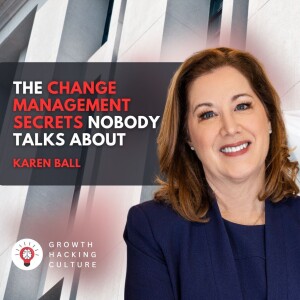
Wednesday Oct 02, 2024
Wednesday Oct 02, 2024
Change is the only constant, especially in the corporate world, with 70% of change initiatives failing due to employee resistance and lack of management support. Beneath the surface of strategic plans, there's a complex human element that often goes unaddressed. In this episode, we explore the hidden challenges of change management, the real reasons transformations fail, and what truly makes change stick. Joining us is Karen Ball, an expert in change management and the ADKAR model, who will share her extensive knowledge on tackling resistance and ensuring successful change initiatives.
About Karen Ball
Karen Ball is a Senior Fellow at Prosci and a former Executive Vice President of Research, Product, and Marketing. With over 40 years of experience, she is a seasoned change management practitioner and author of The ADKAR Advantage: Your New Lens for Successful Change. Karen is also a Certified Change Management Professional™ (CCMP™), Prosci executive instructor, and advisor.
About her book The ADKAR Advantage https://a.co/d/huYUmdc
Karen's LinkedIn profile https://www.linkedin.com/in/karenball26/
Karen's Publications with Prosci https://www.prosci.com/blog/author/karen-ball
What We Discussed in the Episode
What contradictions do you often see in organizations that claim to value innovation but struggle with change?
How can leaders effectively manage subtle forms of resistance to change?
What strategies can organizations use to combat misinformation during change initiatives?
How can leaders create a supportive environment to help employees adopt new behaviors and break old habits?
How can organizations address hidden costs like employee stress and burnout during change?
What can organizations do to maintain momentum and prevent "change fatigue" after multiple transformations?
How can companies sustain change long-term and avoid reverting to old habits when faced with challenges?
_____________
BONUS: My book 𝐒𝐭𝐞𝐩 𝐙𝐞𝐫𝐨 𝐁𝐞𝐟𝐨𝐫𝐞 𝐓𝐡𝐞 𝐇𝐮𝐬𝐭𝐥𝐞 is Now available in Amazon
Launching a business isn't about a brilliant idea. It's about executing that idea brilliantly. And that takes a certain mindset, a certain set of human skills... and 𝐢𝐭 𝐢𝐬 𝐩𝐨𝐬𝐬𝐢𝐛𝐥𝐞 𝐭𝐨 𝐥𝐞𝐚𝐫𝐧 𝐭𝐡𝐞𝐦 𝐛𝐞𝐟𝐨𝐫𝐞 𝐲𝐨𝐮 𝐚𝐜𝐭𝐮𝐚𝐥𝐥𝐲 𝐥𝐚𝐮𝐧𝐜𝐡 𝐚 𝐛𝐮𝐬𝐢𝐧𝐞𝐬𝐬.Get your copy at https://www.ivanpalomino.net/book-step-zero-before-the-hustle
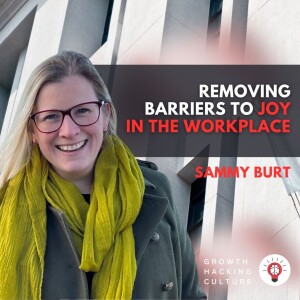
Wednesday Sep 25, 2024
Wednesday Sep 25, 2024
In this episode, we dive into the common barriers that prevent joy in the workplace, from toxic cultures and burnout to unrealistic expectations. More importantly, we’ll explore actionable strategies to overcome these obstacles and create a work environment where joy and fulfillment can flourish. Whether you're a leader or an employee, you’ll find valuable insights to help remove the barriers to joy and enhance well-being in your own work life.
About Sammy Burt
Sammy is the founder of Backpack and founding consultant of Farleigh Performance, two consultancies that specialize in cultural and strategic development. As a systems coach and consultant, Sammy works with organizations, teams, and leaders to foster positive work cultures that support joy, growth, and success.
Connect with Sammy
LinkedIn https://www.linkedin.com/in/sammyburt/
Facebook Author https://www.facebook.com/sammyburtauthor
Instagram Author https://www.instagram.com/sammy_burt_backpack_author/
Farleigh Performance www.farleighperformance.com
The Grown up Book https://www.yourbackpack.co.uk/whatisagrownupanyway
What We Discussed in the Episode
What are the most common misconceptions about workplace joy, and how can these be addressed?
How do you define "joy" in the context of work—happiness, fulfillment, or something else?
What are the biggest barriers to joy in the workplace that you've observed or encountered?
How can organizations create a more joyful and supportive work environment for their employees?
What practical strategies can individuals use to boost their own joy and satisfaction at work?
What role do leaders play in fostering a culture of joy and well-being within their teams?
Can you share examples of companies that have successfully prioritized workplace joy and the strategies they’ve implemented?
What trends or emerging technologies do you think will shape the future of workplace joy and employee well-being?
_____________
BONUS: My book 𝐒𝐭𝐞𝐩 𝐙𝐞𝐫𝐨 𝐁𝐞𝐟𝐨𝐫𝐞 𝐓𝐡𝐞 𝐇𝐮𝐬𝐭𝐥𝐞 is Now available in Amazon
Launching a business isn't about a brilliant idea. It's about executing that idea brilliantly. And that takes a certain mindset, a certain set of human skills... and 𝐢𝐭 𝐢𝐬 𝐩𝐨𝐬𝐬𝐢𝐛𝐥𝐞 𝐭𝐨 𝐥𝐞𝐚𝐫𝐧 𝐭𝐡𝐞𝐦 𝐛𝐞𝐟𝐨𝐫𝐞 𝐲𝐨𝐮 𝐚𝐜𝐭𝐮𝐚𝐥𝐥𝐲 𝐥𝐚𝐮𝐧𝐜𝐡 𝐚 𝐛𝐮𝐬𝐢𝐧𝐞𝐬𝐬.Get your copy at https://a.co/d/7Ir3zEx
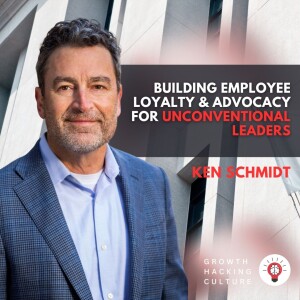
Wednesday Sep 11, 2024
Ken Schmidt on Building Employee Loyalty & Advocacy for Unconventional Leaders
Wednesday Sep 11, 2024
Wednesday Sep 11, 2024
The traditional methods of fostering employee loyalty—like offering perks such as free snacks and game rooms—are no longer enough to meet the needs of today's workforce. Modern employees seek deeper connections, a sense of purpose, and opportunities for personal and professional growth. Leaders must now adopt unconventional strategies to build lasting loyalty. Drawing inspiration from iconic brands like Harley-Davidson, known for its deeply loyal community of Harley Owners Group (HOG) members, offers valuable insights into creating long-term employee engagement and advocacy.
About Ken Schmidt
Ken Schmidt, former Director of Communications at Harley-Davidson, is the author of Make Some Noise: The Unconventional Road to Dominance. His book draws on the metaphor of a motorcycle ride to explore how brands can cultivate customer loyalty, using a three-question approach: What do your customers say about you? What do you want them to say? How can you get them to say it?
More about Ken Schmidt on https://kenspeaks.com/ or on LinkedIn https://www.linkedin.com/in/ken-schmidt-5b08115/
What We Discussed in the Episode
What are some common mistakes leaders make that unintentionally erode employee loyalty?
What qualities make a leader effective in building employee loyalty and advocacy?
How important is it for leaders to empower employees as brand advocates on social media? What tips can encourage this?
How do you measure the success of employee loyalty and advocacy programs? What key metrics should be tracked?
How can brands align their employee engagement efforts with their identity and culture, like Harley-Davidson has done?
How does adopting an unconventional leadership style impact employee loyalty compared to traditional methods?
_____
About the Growth Hacking Culture Podcast
The Growth Hacking Culture Podcast is a series of insightful interviews with prominent experts on mindsets, skills and mental resources to grow individually, lead motivated teams and create human-centric work cultures. These episodes are about thought provoking ideas to scale up and growth hack human-centric and performing work cultures. Hosted by Ivan Palomino
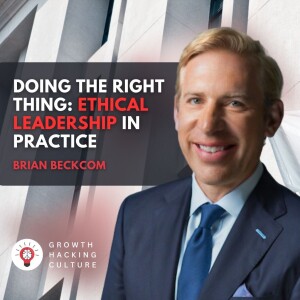
Wednesday Sep 04, 2024
Brian Beckcom on Doing the Right Thing: Ethical Leadership in Practice
Wednesday Sep 04, 2024
Wednesday Sep 04, 2024
A recent study by the Ethics & Compliance Initiative revealed a significant gap between the importance of ethical leadership and its perception among employees. While more than 99% of employees believe it's crucial for leaders to be ethical, only 24% feel their leaders meet this standard. This disparity highlights the urgent need for a stronger focus on ethical leadership in the workplace.
About Brian Beckom
Brian Beckcom is a distinguished Computer Scientist, Philosopher, and Trial Lawyer based in Houston, Texas. With 14 consecutive Texas Super Lawyer titles, Brian is recognized as one of the top legal minds in the state. His firm, VB Attorneys, is widely regarded as one of the best law firms in the United States.
Reaching Brian Beckom:
LinkedIn https://www.linkedin.com/in/brianbeckcom/
His podcast Lessons from Leaders with Brian Beckcom https://www.brianbeckcom.org/
What We Discussed in this Episode on Ethical Leadership
What are the most important ethical principles that leaders should uphold in today's workplace?
What are the common ethical dilemmas leaders face, and how can they navigate these challenges effectively?
How can leaders foster a positive and ethical workplace culture?
What ethical decision-making frameworks can guide leaders in making the right choices?
How does accountability play a role in ethical leadership, and how can leaders ensure they are held accountable?
What are the emerging trends in ethical leadership, and how are they shaping the future of leadership and ethics?
What advice would you give to aspiring leaders who want to make ethical decisions in their careers?
_____
About the Growth Hacking Culture Podcast
The Growth Hacking Culture Podcast is a series of insightful interviews with prominent experts on mindsets, skills and mental resources to grow individually, lead motivated teams and create human-centric work cultures. These episodes are about thought provoking ideas to scale up and growth hack human-centric and performing work cultures. Hosted by Ivan Palomino
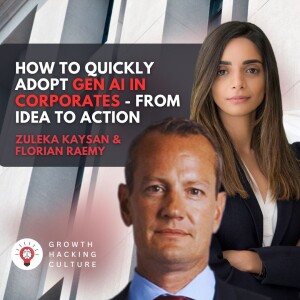
Monday Aug 26, 2024
Monday Aug 26, 2024
Generative AI (GenAI) is making waves in the tech world, with experts describing it as a "technological tsunami." But what does this mean in reality? In this conversation, we delve into why GenAI is generating so much buzz, how it fits into the broader AI landscape, and which industries and functions are most poised for disruption.
We'll also explore the challenges of adopting GenAI, from human and financial hurdles to IT issues, and share real-world success stories of non-tech companies leveraging GenAI for growth and innovation. Learn how to strategically approach GenAI adoption and manage the change it brings to your organization.
About Zuleka Kaysan and Florian Raemy
Zuleka Kaysan is the Managing Director of The Cornerstone Advisory, where she leverages over 18 years of experience in business transformation to help organizations enhance innovation and operational performance.
Florian Raemy is the CEO of Prometee, an AI-first Swiss consultancy that specializes in guiding companies through the complexities of AI adoption and implementation.
What We Discussed on Gen AI Adoption
How easy is it to adopt AI in corporate environments?
What are the major human and technical challenges in implementing AI successfully?
Can you share examples of non-tech companies effectively using AI, and how they’ve done it?
What are the first steps companies should take to start using AI, and what should they watch out for?
How can organizations prepare themselves to be AI-ready?
What are your top three pieces of advice for CEOs who are in "wait and see" mode regarding AI adoption?
See the video recording on our YouTube Channel
_____
About the Growth Hacking Culture Podcast
The Growth Hacking Culture Podcast is a series of insightful interviews with prominent experts on mindsets, skills and mental resources to grow individually, lead motivated teams and create human-centric work cultures. These episodes are about thought provoking ideas to scale up and growth hack human-centric and performing work cultures. Hosted by Ivan Palomino
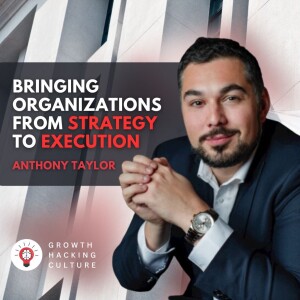
Wednesday Aug 14, 2024
Wednesday Aug 14, 2024
The "strategy-to-execution gap" is a critical issue that many organizations face, often leading to significant losses in strategic potential. According to a study by Harvard Business Review, executives reported that their organizations lose 40% of their strategy's potential value due to breakdowns in execution. Additionally, the Project Management Institute (PMI) found that 37% of projects fail because of a lack of clearly defined objectives and milestones, which are essential for successful execution.
About Anthony C. Taylor
Anthony Taylor is the CEO of SME Strategy, where he helps organizations achieve true strategic planning and alignment. He is also the author of two books and the host of the Strategy and Leadership Podcast.
Learn more about Anthony C Taylor
The Strategy and Leadership Podcast https://www.smestrategy.net/strategy-and-leadership-podcast
Anthony's LinkedIn Profile https://www.linkedin.com/in/anthonyctaylor604/
What We Discussed in this Episode on Bringing Organizations from Strategy to Execution
What are the common mistakes businesses make when executing their strategy?
How can businesses achieve strategic alignment effectively?
Are SMART goals still relevant, or are OKRs becoming more popular in strategic planning?
What are the best tips for overcoming execution challenges in business strategy?
How can businesses leverage technology to enhance operational efficiency and strategic alignment?
What are the key steps to creating a culture of execution in an organization?
What advice can help businesses struggling to achieve their strategic goals?
BONUS - Be the First to Read Step Zero, Before The Hustle
Announcement on my upcoming book on how to prepare your human skills for the Journey of Entrepreneurship: Step Zero, Before The Hustle https://www.ivanpalomino.net/book-step-zero-before-the-hustle
_____
About the Growth Hacking Culture Podcast
The Growth Hacking Culture Podcast is a series of insightful interviews with prominent experts on mindsets, skills and mental resources to grow individually, lead motivated teams and create human-centric work cultures. These episodes are about thought provoking ideas to scale up and growth hack human-centric and performing work cultures. Hosted by Ivan Palomino
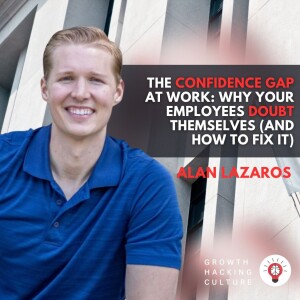
Tuesday Aug 06, 2024
Tuesday Aug 06, 2024
Employee confidence is a cornerstone of organizational success, yet many employees struggle with self-doubt, imposter syndrome, and a fear of failure. These issues can hinder their potential and negatively impact team performance, leading to hesitant decision-making and missed opportunities for innovation.
In this interview with Alan Lazaros, CEO of Next Level University, we delve into the complexities of building a culture of confidence within organizations. We'll explore the root causes of self-doubt, the generational nuances affecting confidence levels, and the tangible consequences for businesses. Most importantly, we'll uncover actionable strategies for leaders to foster a workplace where every employee feels empowered, capable, and confident in their contributions.
About Alan Lazaros
Alan Lazaros, an engineer turned one of the most recognized self-help wizards, is the CEO of Next Level University. With his expertise, Alan has helped countless individuals and organizations build confidence and achieve their full potential.
How to reach Alan:
On his website https://www.nextleveluniverse.com/
On LinkedIn https://www.linkedin.com/in/alanlazarosllc/
The key questions on the confidence gap at work
What are the main reasons employees lack confidence in the workplace?
How do factors like imposter syndrome and fear of failure contribute to low employee confidence?
What differences in confidence levels have you observed between younger generations and previous generations in the workforce?
How does a lack of confidence among employees affect overall organizational performance?
What strategies can leaders use to create a work environment that fosters employee confidence and self-belief?
How can leaders address their own self-doubt to better support a confident workplace?
What are some effective ways to scale confidence-building efforts across an entire organization?
Is it possible to build a culture of confidence without incurring high costs for the organization?
_____
About the Growth Hacking Culture Podcast
The Growth Hacking Culture Podcast is a series of insightful interviews with prominent experts on mindsets, skills and mental resources to grow individually, lead motivated teams and create human-centric work cultures. These episodes are about thought provoking ideas to scale up and growth hack human-centric and performing work cultures. Hosted by Ivan Palomino









